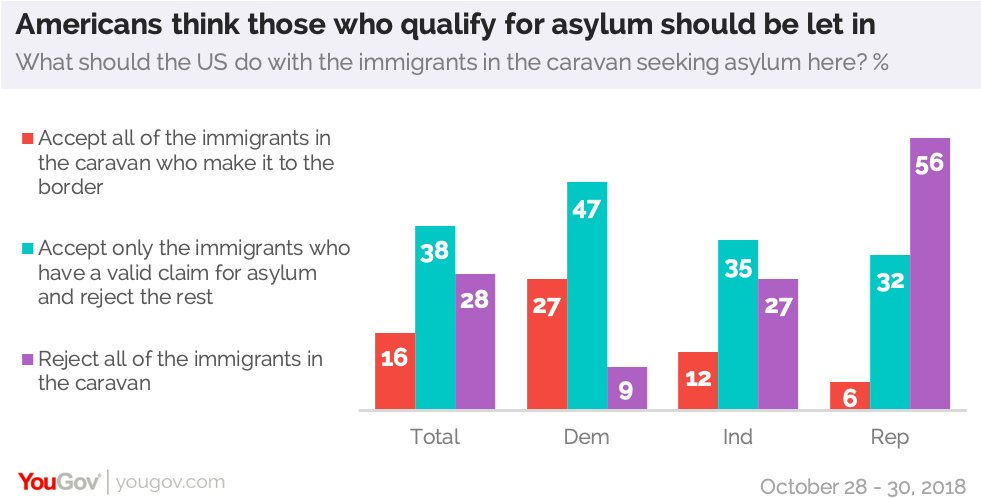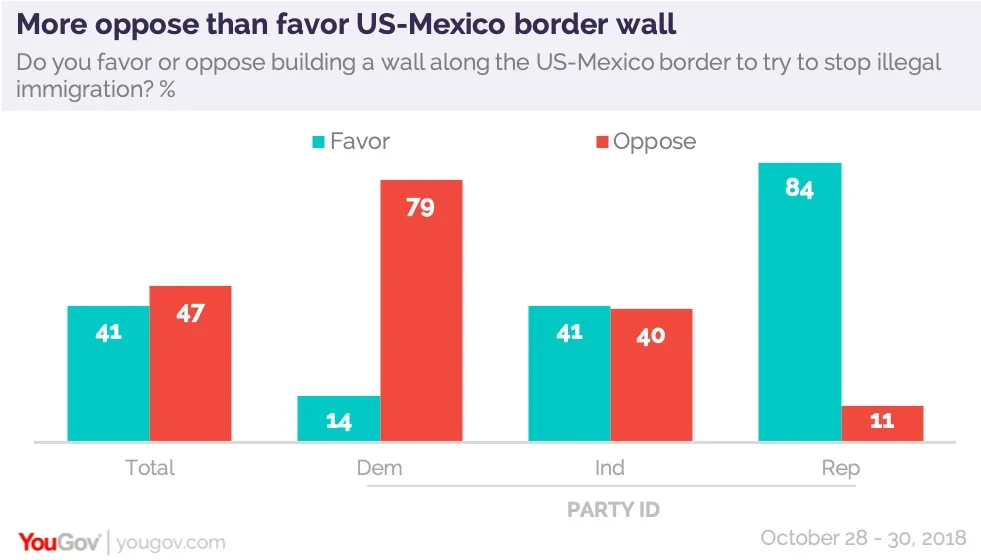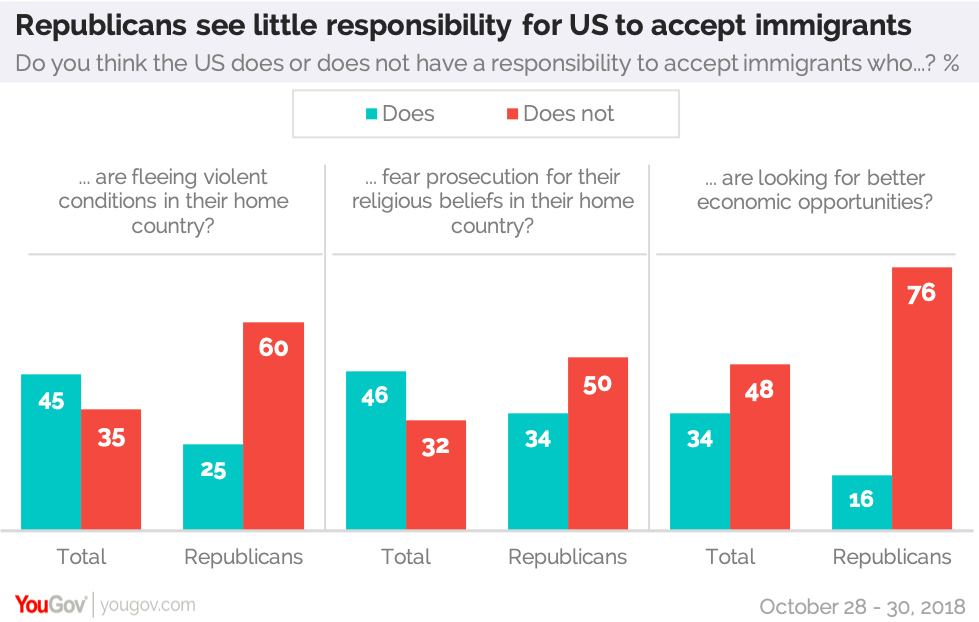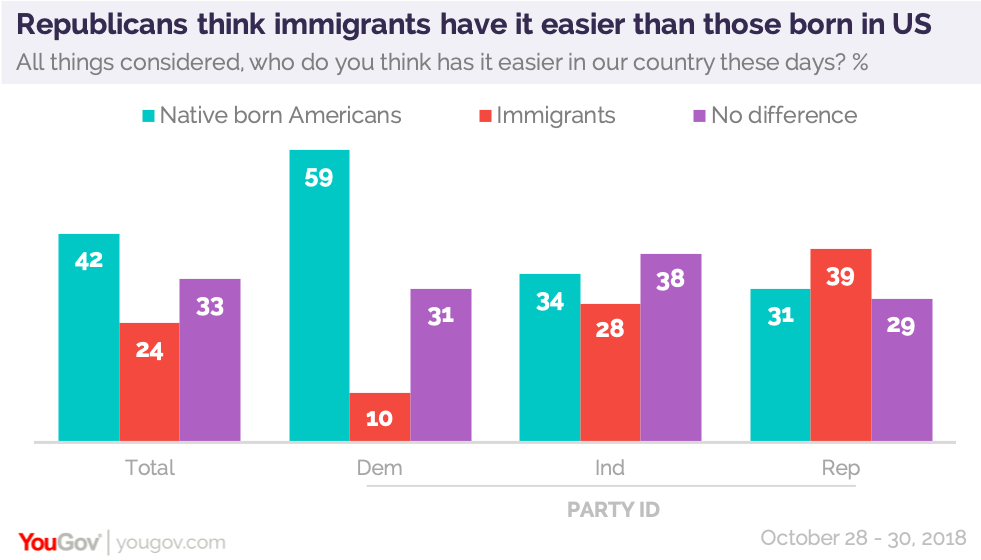More than a quarter of Americans think everyone in the caravan should be turned away at the border
As the Central American “caravan” of would-be immigrants moves slowly through Mexico, opinions about immigration remain polarized, with Republicans in the latest Economist/YouGov Poll rejecting any US responsibility in helping those fleeing violence, poverty and even religious persecution.
Last week, Republicans reported that immigration would be the most important factor in their vote. It still is, with one in four registered voters who say they will vote for the GOP Congressional candidate naming immigration as the most important factor in their vote (17% of Republican voters cite the economy, 16% name the party of the candidates as most important).
Republicans may be motivated in part by the caravan, frequently referenced by President Trump in his campaign rallies, and they take a strong position against it. More than half would prevent everyone in the caravan from being accepted as asylum seekers in the US In the overall public, a majority would accept those who qualify as asylum seekers.

Republicans are more likely than others to see Middle Eastern terrorists in the migrant caravan: 55% believe at least “some” of the marchers are terrorists. Democrats and independents are more likely to think “very few” or “none” of the marchers fit that description.
There is, however, more support than opposition to sending US troops to the border. Overall, 44% approve of the President’s decision to do that, 33% don’t. Nearly all Republicans (87%) approve of sending troops, as do 43% of independents. Democrats oppose sending troops by about four to one, 59% to 15%.
Perhaps nowhere is the partisan gap as wide as on the question of building a wall on the US-Mexico border, one of the President’s signature campaign promises. The public overall opposes the wall (although by only a six point margin). Republicans favor a wall by nearly eight to one. Independents divide evenly.

In a nation where most people know their national origins, and are aware of an immigrant ancestry, the rhetoric surrounding immigration today clearly splits the country. More than three in four overall (and nearly as many Republicans) agree that the United States is a “nation of immigrants.” But most of those who don’t agree see immigration as something that has damaged the country, not made it better. That’s a different view than that of the overall public.
By more than two to one, the public overall believe immigration had made the United States better off, not worse off.
Nearly four in ten nationally think immigrants face “a great deal” of discrimination. But that’s not the case among Republicans. Only 17% of Republicans say that’s the case.
Many Republicans see no reason for the US to offer asylum to refugees. While pluralities of the public overall would offer asylum to those fleeing violence or religious persecution (though not those looking for economic prosperity), Republicans say the US has no responsibility in any of these situations.

Some of the reasoning behind the GOP rejection of immigrants appears to be due to a belief that immigrants have an easier time of it than native-born Americans do.
While by nearly two to one, the public thinks those who are native-born Americans have it easier in this country than immigrants do, Republicans disagree. 2016 Trump voters are even more sure about that – just about twice as many Trump voters say immigrants have things easier than native-born Americans do.

Hispanics, many of whom are recent immigrants, are four times as likely to believe that native-born Americans have an easier time of it that immigrants do.
For many who think immigrants have it easier, this marks a change. Most of those who think the native-born have it easier than immigrants do say this has always been the case. That’s not so for those who think the opposite. By more than two to one, they think this is a change from the way things used to be. Thinking that native-born Americans may be subject to new hardships immigrants don’t face probably intensifies the negative response to today’s immigrants as well as to those who want to come to the US.
Immigration has become a powerful factor in the GOP Congressional vote. About eight in ten Congressional Republican voters each view the economy and immigration as very important in their vote. But immigration ranks seven points higher than the economy when they are asked for the most important factor.
See full toplines and tables results
Image: Getty







